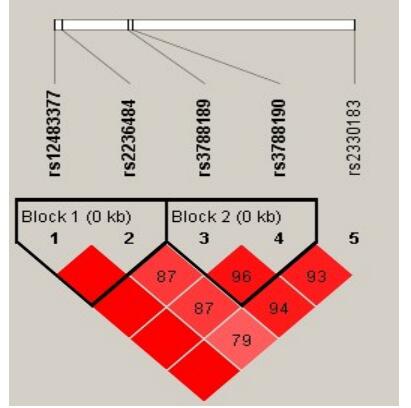 PDF(1024 KB)
PDF(1024 KB)


Association between maternal reduced folate carrier gene polymorphisms and congenital heart disease in offspring: a case-control study
QIN Jia-Bi, SHENG Xiao-Qi, WANG Ting-Ting, HUANG Peng, LI Yi-Huan, LUO Liu, LIU Yi-Ping, DIAO Jing-Yi, ZHU Ping
Chinese Journal of Contemporary Pediatrics ›› 2021, Vol. 23 ›› Issue (6) : 547-554.
 PDF(1024 KB)
PDF(1024 KB)
 PDF(1024 KB)
PDF(1024 KB)
Association between maternal reduced folate carrier gene polymorphisms and congenital heart disease in offspring: a case-control study
Objective To study the association between maternal reduced folate carrier (RFC) gene polymorphisms and congenital heart disease (CHD) in offspring. Methods A hospital-based case-control study was conducted. The mothers of 683 infants with CHD who attended the Department of Cardiothoracic Surgery, Hunan Children's Hospital, from November 2017 to March 2020 were enrolled as the case group. The mothers of 740 healthy infants without any deformity who attended the hospital during the same period of time were enrolled as the control group. A questionnaire survey was performed to collect the exposure data of subjects. Venous blood samples of 5 mL were collected from the mothers for genetic polymorphism detection. A multivariate logistic regression analysis was used to evaluate the association of RFC gene polymorphisms and their haplotypes with CHD. A generalized multifactor dimensionality reduction method was used to analyze gene-gene interactions. Results After control for confounding factors, the multivariate logistic regression analysis showed that maternal RFC gene polymorphisms at rs2236484 (AG vs AA:OR=1.91, 95%CI:1.45-2.51; GG vs AA: OR=1.96, 95%CI:1.40-2.75) and rs2330183 (CT vs CC:OR=1.39, 95%CI:1.06-1.83) were significantly associated with the risk of CHD in offspring. The haplotypes of G-G (OR=1.21, 95%CI:1.03-1.41) and T-G (OR=1.25, 95%CI:1.07-1.46) in mothers significantly increased the risk of CHD in offspring. The interaction analysis showed significant gene-gene interactions between different SNPs of the RFC gene in CHD (P < 0.05). Conclusions Maternal RFC gene polymorphisms and interactions between different SNPs are significantly associated with the risk of CHD in offspring.

Congenital heart disease / Reduced folate carrier gene / Case-control study / Haplotype / Interaction / Offspring
[1] Liu YJ, Chen S, Zühlke L, et al. Global birth prevalence of congenital heart defects 1970-2017:updated systematic review and meta-analysis of 260 studies[J]. Int J Epidemiol, 2019, 48(2):455-463. DOI:10.1093/ije/dyz009. PMID:30783674.
[2] Zhao QM, Liu F, Wu L, et al. Prevalence of congenital heart disease at live birth in China[J]. J Pediatr, 2019, 204:53-58. DOI:10.1016/j.jpeds.2018.08.040. PMID:30270157.
[3] Zhao LJ, Chen LZ, Yang TB, et al. Birth prevalence of congenital heart disease in China, 1980-2019:a systematic review and meta-analysis of 617 studies[J]. Eur J Epidemiol, 2020, 35(7):631-642. DOI:10.1007/s10654-020-00653-0. PMID:32519018.
[4] Wang TT, Chen LZ, Yang TB, et al. Congenital heart disease and risk of cardiovascular disease:a meta-analysis of cohort studies[J]. J Am Heart Assoc, 2019, 8(10):e012030. DOI:10.1161/JAHA.119.012030. PMID:31070503.
[5] Willinger L, Brudy L, Meyer M, et al. Prognostic value of non-acute high sensitive troponin-T for cardiovascular morbidity and mortality in adults with congenital heart disease:a systematic review[J]. J Cardiol, 2021. DOI:10.1016/j.jjcc.2021.02.008. PMID:33678488. Epub ahead of print.
[6] Qu YJ, Lin S, Zhuang J, et al. First-trimester maternal folic acid supplementation reduced risks of severe and most congenital heart diseases in offspring:a large case-control study[J]. J Am Heart Assoc, 2020, 9(13):e015652. DOI:10.1161/JAHA.119.015652. PMID:32613868.
[7] Shi H, Yang SW, Liu Y, et al. Study on environmental causes and SNPs of MTHFR, MS and CBS genes related to congenital heart disease[J]. PLoS One, 2015, 10(6):e0128646. DOI:10.1371/journal.pone.0128646. PMID:26035828.
[8] Li YH, Diao JY, Li JQ, et al. Association of maternal dietary intakes and CBS gene polymorphisms with congenital heart disease in offspring[J]. Int J Cardiol, 2021, 322:121-128. DOI:10.1016/j.ijcard.2020.08.018. PMID:32800907.
[9] Imani MM, Mozaffari HR, Sharifi R, et al. Polymorphism of reduced folate carrier 1(A80G) and non-syndromic cleft lip/palate:a systematic review and meta-analysis[J]. Arch Oral Biol, 2019, 98:273-279. DOI:10.1016/j.archoralbio.2018.12.005. PMID:30579244.
[10] Shaw GM, Zhu HP, Lammer EJ, et al. Genetic variation of infant reduced folate carrier (A80G) and risk of orofacial and conotruncal heart defects[J]. Am J Epidemiol, 2003, 158(8):747-752. DOI:10.1093/aje/kwg189. PMID:14561664.
[11] Shaw GM, Lu W, Zhu HP, et al. 118 SNPs of folate-related genes and risks of spina bifida and conotruncal heart defects[J]. BMC Med Genet, 2009, 10:49. DOI:10.1186/1471-2350-10-49. PMID:19493349.
[12] Viswanathan M, Treiman KA, Kish-Doto J, et al. Folic acid supplementation for the prevention of neural tube defects an updated evidence report and systematic review for the US Preventive Services Task Force[J]. JAMA, 2017, 317(2):190-203. DOI:10.1001/jama.2016.19193. PMID:28097361.
[13] Zhou YL, Sinnathamby V, Yu YM, et al. Folate intake, markers of folate status and oral clefts:an updated set of systematic reviews and meta-analyses[J]. Birth Defects Res, 2020, 112(19):1699-1719. DOI:10.1002/bdr2.1827. PMID:33118705.
[14] Chango A, Emery-Fillon N, de Courcy GP, et al. A polymorphism (80G->A) in the reduced folate carrier gene and its associations with folate status and homocysteinemia[J]. Mol Genet Metab, 2000, 70(4):310-315. DOI:10.1006/mgme.2000.3034. PMID:10993718.
[15] 裴丽君, 李竹. 还原叶酸载体基因(RFC1)与神经管和颅面畸形病因学关系的研究进展[J]. 遗传, 2004, 26(2):239-243. DOI:10.3321/j.issn:0253-9772.2004.02.022. PMID:15639995.
[16] Eudy JD, Spiegelstein O, Barber RC, et al. Identification and characterization of the human and mouse SLC19A3 gene:a novel member of the reduced folate family of micronutrient transporter genes[J]. Mol Genet Metab, 2000, 71(4):581-590. DOI:10.1006/mgme.2000.3112. PMID:11136550.
[17] 弟娟娟, 王金桃, 丁玲, 等. 还原叶酸载体基因多态性与宫颈癌关系的病例对照研究[J]. 中华流行病学杂志, 2009, 30(2):189-191. DOI:10.3760/cma.j.issn.0254-6450.2009.02.022. PMID:19565885.
[18] O'leary VB, Pangilinan F, Cox C, et al. Reduced folate carrier polymorphisms and neural tube defect risk[J]. Mol Genet Metab, 2006, 87(4):364-369. DOI:10.1016/j.ymgme.2005.09.024. PMID:16343969.
[19] Soghani B, Ebadifar A, Khorram Khorshid HR, et al. The study of association between reduced folate carrier 1(RFC1) polymorphism and non-syndromic cleft lip/palate in Iranian population[J]. Bioimpacts, 2017, 7(4):263-268. DOI:10.15171/bi.2017.31. PMID:29435434.
[20] 裴丽君, 任爱国, 郝玲, 等. 还原叶酸载体基因多态性与先天性心脏病和唇腭裂关联的研究[J]. 中华流行病学杂志, 2004, 25(12):1063-1067. DOI:10.3760/j.issn:0254-6450.2004.12.013. PMID:15769366.
[21] Wang BJ, Liu MJ, Yan WH, et al. Association of SNPs in genes involved in folate metabolism with the risk of congenital heart disease[J]. J Matern Fetal Neonatal Med, 2013, 26(18):1768-1777. DOI:10.3109/14767058.2013.799648. PMID:23701284.
[22] 孙盼盼. rs2241766及rs266729位点与2型糖尿病关联的遗传模式推导[D]. 郑州:郑州大学, 2018.
[23] Balding DJ. A tutorial on statistical methods for population association studies[J]. Nat Rev Genet, 2006, 7(10):781-791. DOI:10.1038/nrg1916. PMID:16983374.
[24] 李岩. DIP2基因家族单核苷酸多态性与孤独症谱系障碍及其临床表型的关联研究[D]. 长春:吉林大学, 2020.